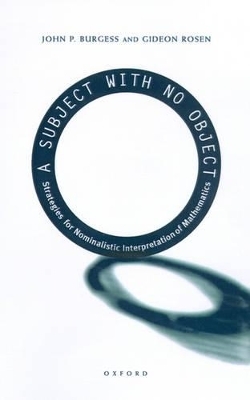
A Subject With No Object
Strategies for Nominalistic Interpretation of Mathematics
Seiten
1997
Clarendon Press (Verlag)
978-0-19-823615-3 (ISBN)
Clarendon Press (Verlag)
978-0-19-823615-3 (ISBN)
A study of philosophical attempts to interpret mathematics in nominalistic terms. Clear, concise, critical accounts are given of the various versions of nominalism that have played a significant role in the philosophy of mathematics in recent decades.
Numbers and other mathematical objects are exceptional in having no locations in space or time or relations of cause and effect. This makes it difficult to account for the possibility of the knowledge of such objects, leading many philosophers to embrace nominalism, the doctrine that there are no such objects, and to embark on ambitious projects for interpreting mathematics so as to preserve the subject while eliminating its objects.
A Subject With No Object cuts through a host of technicalities that have obscured previous discussions of these projects, and presents clear, concise accounts, with minimal prerequisites, of a dozen strategies for nominalistic interpretation of mathematics, thus equipping the reader to evaluate each and to compare different ones. The authors also offer critical discussion, rare in the literature, of the aims and claims of nominalistic interpretation, suggesting that it is significant in a very different way from that usually assumed.
Numbers and other mathematical objects are exceptional in having no locations in space or time or relations of cause and effect. This makes it difficult to account for the possibility of the knowledge of such objects, leading many philosophers to embrace nominalism, the doctrine that there are no such objects, and to embark on ambitious projects for interpreting mathematics so as to preserve the subject while eliminating its objects.
A Subject With No Object cuts through a host of technicalities that have obscured previous discussions of these projects, and presents clear, concise accounts, with minimal prerequisites, of a dozen strategies for nominalistic interpretation of mathematics, thus equipping the reader to evaluate each and to compare different ones. The authors also offer critical discussion, rare in the literature, of the aims and claims of nominalistic interpretation, suggesting that it is significant in a very different way from that usually assumed.
John Burgess is Professor of Philosophy at Princeton University, where he has taught since 1975. He has published widely on the philosophy of mathematics and logic. Gideon Rosen is Assistant Professor of Philosophy at Princeton University. He was previously Assistant Professor at the University of Michigan and a Visiting Lecturer at the University of Auckland, New Zealand.
| Erscheint lt. Verlag | 16.1.1997 |
|---|---|
| Zusatzinfo | line drawings |
| Verlagsort | Oxford |
| Sprache | englisch |
| Maße | 145 x 226 mm |
| Gewicht | 500 g |
| Themenwelt | Geisteswissenschaften ► Philosophie ► Logik |
| Mathematik / Informatik ► Mathematik ► Allgemeines / Lexika | |
| ISBN-10 | 0-19-823615-8 / 0198236158 |
| ISBN-13 | 978-0-19-823615-3 / 9780198236153 |
| Zustand | Neuware |
| Informationen gemäß Produktsicherheitsverordnung (GPSR) | |
| Haben Sie eine Frage zum Produkt? |
Mehr entdecken
aus dem Bereich
aus dem Bereich
ein Gegenentwurf zum kurzfristigen Denken : so werden wir zu den …
Buch | Hardcover (2023)
REDLINE (Verlag)
CHF 27,90
Buch | Softcover (2023)
De Gruyter (Verlag)
CHF 34,90


